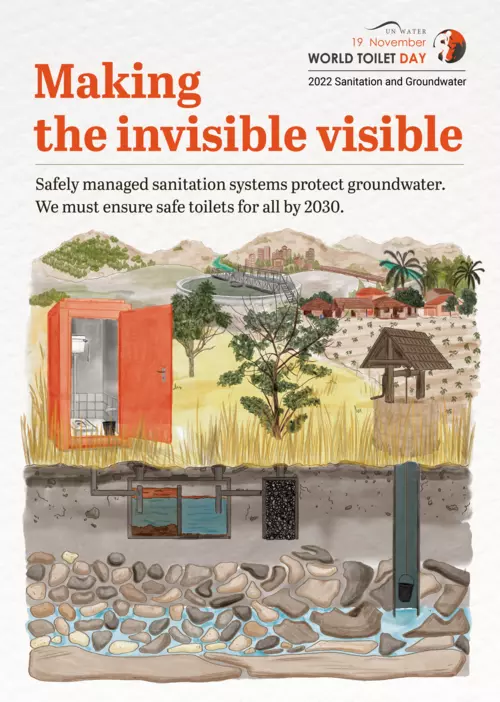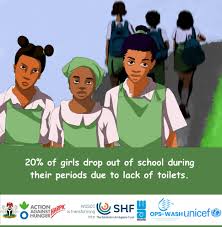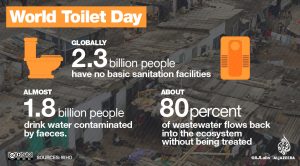
By Bernard Tavershima Gogo
The celebration of World Toilet Day was held on November 19, but the issues that the annual ritual raises remain relevant beyond November 19. World Toilet Day gives visibility to the importance of safe toilets, a natural human necessity, under emphasised at a huge cost in many homes and business premises.
Until we make provision of safe toilets fanciful and ensure toilet facilities are sexy, the world will not achieve Sustainable Development Goal (SDG) 6.2, which calls for providing safe restrooms for all by 2030. (United Nations, UN 2022). SDG 6.2 specific words are: By 2030, achieve access to adequate and equitable sanitation and hygiene for all and end open defecation, paying special attention to the needs of women and girls and those in vulnerable situations
A toilet is a sanitary facility that collects human waste for disposal; some toilets use water (flush toilets), while others do not (dry toilets). These toilets can be made with additional considerations for those with impairments, or they can be made for a squatting position with a toilet seat. Flush toilets are typically connected to a sewage system in urban areas that goes to septic tanks in remote locations. To store and treat waste, dry toilets are connected to a pit, detachable container, decomposing chamber, or other devices.
A toilet facility hygienically separates human interaction from human excreta is considered an improved sanitary facility. The ability to flush or pour-flush into a piped sewer system, use a septic tank, or use Pit latrines with slabs, upgraded pit latrines with ventilation, and Toilets with composting are examples of improved sanitation facilities. Unimproved sanitation facilities include toilets with no slab or open pit, – A bucket, hanging latrine, or hanging toilet, – No buildings, trees, or open spaces (open defecation) (WHO, 2022)
The World Toilet Day is observed annually to raise awareness of the global sanitation crisis, particularly the high rate of open defecation.
Since 2013, World Toilets Day has been a recognized annual international United Nations (UN) event, with UN-Water serving as the primary organizer. Making the invisible visible is the subject of the 2022 World Toilet Day campaign. Each annual event has a different theme. (United Nations, UN 2022
Problem statement
The campaign for the 2022 World Toilet Day topic aims to address the undetectable contamination of groundwater sources due to subpar sanitary infrastructure. Regrettably, sanitation difficulties continue to be concerning despite yearly attempts by numerous groups, including the government, non-governmental organisations, and institutions, to attain sustainable development targets by 2030.
Global Statistics
In 2021, the WHO/UNICEF Joint Monitoring Program for water and sanitation and hygiene reported that despite a 1.7 billion increase in global population between 2000 and 2020, 2.4 billion more individuals now have access to safely managed sanitation services, that is, a minimal facility where excreta are either treated off-site or disposed of locally. Even so, only 3.6 billion individuals had access to properly managed services in 2020, of which 1.9 billion (or about half) did.
Among the 1.7 billion individuals without access to even basic amenities, 616 million people utilized “unimproved” sanitation facilities, while 580 million shared improved sanitation facilities with other households. The results show stark differences, with two-thirds of those who were still without even the most basic services residing in rural areas. They were nearly all from sub-Saharan Africa.
In the African region, the population of Africa has risen from 800 million to 1.3 billion people between 2000 and 2020. At least basic sanitation facilities were made available to almost 290 million people throughout that time. However, these basic services are still unavailable to 779 million people.

Among them, 208 million continue to use open defecation. In Africa, just 29% of healthcare institutions offer simple sanitation services, 33% of households have access to basic sanitation services, and 21% utilize safely supervised facilities, according to statistics from the Joint Monitoring Program, 2020. A safe sanitation system is unavailable to two out of every three persons. According to the same survey, 5% of urban and 27% of rural Africans still defecate in the open.
The statistics of the African region showed the least percentage of the population using safely managed sanitation services. Sub-Sahara Africa has a higher percentage of unmanaged sanitation services and open defecation (WHO, African Region, 2022).
Over 60 million Nigerians are without access to basic drinking water due to poor infrastructure, a lack of necessary human resources, low investment, and a weak enabling regulatory environment, among other issues.
167 million people lacked access to even the most basic handwashing facilities, and 80 million lacked better sanitation facilities.
In rural regions, 39% of households lack access to a basic water supply.
Only half of the rural families have access to improved sanitation, and over a third (29%) still practice open defecation—a percentage that has barely changed since 1990 (World Bank 2021)
In 2020, Nigeria’s total population using safely managed sanitation services was 30.51%; urban accounts for 35.06% while rural accounts for 25.59% while the population using at least basic sanitation service is 42.72%; the urban areas account for 51.68% and the rural account for 33.03%. The population practising open defecation is 18.66%, and urban account for 8.47%, while rural communities account for 29.68% (World Health Organization, 2022).

Despite hopeful advancements in sanitation, there is still much to be done, and access discrepancies were still very wide in 2020. Universal access has been attained in almost all industrialized nations, although sanitation coverage varies greatly in underdeveloped nations. Eight nations had achieved universal access to safely managed services by 2020, making 62 countries where this goal had been reached (>99%). Yet in 48 nations, fewer than 50% of the populace had services that were safely managed (WHO/UNICEF JMP, 2021)
Nigeria’s roadmap to ending open defecation
The 2021 WASH National Outcome Routine Mapping (WASHNORM) survey found that 48 million individuals practice open defecation in Nigeria. As a result of inadequate sanitation, Nigeria loses around 1.3% (N455 billion) of its GDP every year. Additionally, diseases linked to poor water and sanitation claim the lives of more than 100,000 children under the age of five every year.
In November 2018, the Nigerian President, demonstrating political will at the highest level of government, declared a state of emergency in the Water, Sanitation, and Hygiene (WASH) sector and launched a national campaign with the tagline “Clean Nigeria: Use the Toilet” to kick-start the nation’s journey toward becoming Open Defecation Free (ODF) by 2025. (Water Aid, Nigeria)
The government of Nigeria has reaffirmed its commitment to enhancing access to WASH services with the launch of the national campaign with the slogan “Clean Nigeria: Use the Toilet.” The Federal Government of Nigeria has created programmes like the National Urban Water Sector Reform Program (NUWSRP) to increase access to water and sanitation, including the construction of over 2,300 additional Water Points, 6,546 sanitation compartments, and hygiene facilities across the nation, with the assistance of the World Bank and other development partners.
A sister programme- the Sustainable Urban and Rural Water Supply, Sanitation and Hygiene (SURWASH) Programme aims to improve WASH services in 2,000 schools and healthcare facilities, offer 6 million Nigerians basic drinking water services, support 1.4 million in gaining access to improved sanitation services, and help 500 communities become ODFs (World Bank 2021)
More recently, on November 18–19, 2022, Nigeria hosted the World Toilet Summit with other host nations under the theme “Sanitation and Innovation for Economic Development,” with key discussions centred on the connection between the economy and the fundamental human right to water, sanitation, and hygiene; The expansion of the sanitation industry; the development of sanitation financial models; and the expansion of the Nigerian sanitation sector for national development. The importance of the 2022 World Toilet Summit subject is due to the increased focus on business sector involvement and overall investment in WASH in 202
Through a focused and collaborative approach, there are novel approaches to closing the industry’s financial, efficiency, and sustainability gaps. The Federal Ministry of Water Resources and the Nigerian Government as a whole are ready to put the topic of WASH advancement at the forefront of discussion to boost the country’s economy (World Toilet Summit, 2022)
By 2030, Sustainable Development Goal 6 must be accomplished with unprecedented efforts. Nigeria must triple its budget or devote at least 1.7% of its present GDP to WASH. The biggest aspirations are for rural sanitation, where there is a 64.1 per cent need for better services. Despite low family incomes, there is little funding for the sub-sector, and considerable household contributions are required to end open defecation (UNICEF, Nigeria 2021)
Need for Awareness
Because of the aforementioned issue, the UN has urged the relevant governments to work four times as rapidly and decision-makers to consider the connection between groundwater and sanitation in their plans to safeguard this vital water supply to meet the 2030 SDGs target. This has been the customary pattern. World Toilet Day is significant because it serves as a reminder of the importance of having proper sanitary infrastructure, as indicated by the theme. Using secure latrines to save subsurface water is not inconceivable, given traditional rural and urban habits.
Toilets are located distant from groundwater sources, which are typically dug wells, in a typical rural community. In essence, most people know these toilets might leak, pollute, or contaminate groundwater supplies, especially when they are built badly. Making the invisible visible shouldn’t just be a catchphrase; it should also serve as a call to action to raise public awareness about the lack of or poor quality of toilet construction, as well as the lack of toilets in many communities, which has led to an increase in sanitation problems that have contaminated underground water sources.
Sanitation crises as crises of the poor people
Communities should be monitored and assessed for the provision of good sanitary infrastructure in light of the growing sanitation problems. Fairness and equity are of utmost importance in this evaluation. This will make it easier for underrepresented and marginalized communities worldwide to obtain decent, functional restrooms. This could involve offering basic conveniences like portable water, contemporary restrooms, and common drainage systems. It’s terrible that when these issues arise, local or foreign help typically sweeps these underprivileged and underrepresented people under the rug. Issues that have a fix. Underprivileged and underrepresented communities should also have a good quality of life.
Sanitation crises as crises of the poor nations
Another area that needs to be given priority is the economy. Sanitation problems in sub-Saharan Africa are related to socio-economic position. Basically, over 220 million people in 2015 engaged in open defecation, which is 18 times more common among the poorest people. Poor hygienic conditions have a significant economic impact. And it’s now very usual for people to live only to survive without considering the consequences of their way of life. Not only should the underdeveloped economy be fed, but it should also be empowered. This will raise living standards, which will, in turn, raise the population’s quality of lif
Until the economy improves, low- and middle-income countries will continue to have unhygienic conditions in their restrooms. Better education should also be provided to those with less privilege. Most people who use open defecation have only informal schooling or none at all. Such folks are exceedingly difficult to persuade through numerous programs to quit using open defecation. When appropriate, a middle-class person who pays for water will undoubtedly also practice open defecation. As a result of a lack of funding, they will still be unable to fix the broken pipe, and eventually, sewage will spill into the environment. The SDGs goals would undoubtedly be difficult to achieve by 2030 unless and until the economy improves or blossoms.
Conclusion
Every 19th of November should be remembered as a day of awareness because communities feel the impacts of the work from concerned and relevant bodies who assure decent environmental conditions while also supplying the necessities and boosting the economy. When sanitation is safely maintained and strategically placed, groundwater and people are safe from faecal waste pathogens. A toilet that efficiently absorbs human waste in a safe, accessible, and respectable environment is the foundation of a secure and long-lasting sanitation system. Improvements in sanitation contribute to advancements in the environment, economy, education, gender equality, and health. Meanwhile, we all have a role to play. May the toilets be with you
References
- United Nations, UN (2022). World Toilet Day, 19th November 2022.
- WHO/UNICEF JMP (2021). Progress on household drinking water, sanitation and hygiene 2000-2020: Five years into the SDGs
- World Health Organization (2022). The global health observatory
- World Health Organization, African Region (2022). World toilet day
- Water Aid, Nigeria (2021). WASH Policy and practice
- World Bank (2021). Nigeria: Ensuring water, sanitation, and hygiene for all
- World Toilet submit (2022). Sanitation and Innovation for Economic Development
The Writer, Bernard Tavershima Gogo is a Biologist with expertise in environmental technology and management.
Leave a Reply